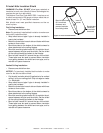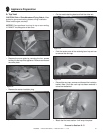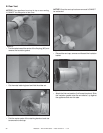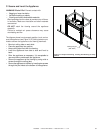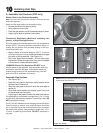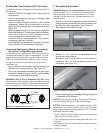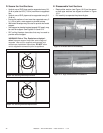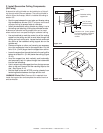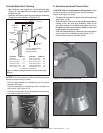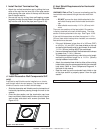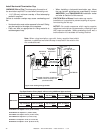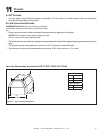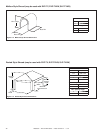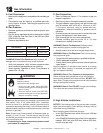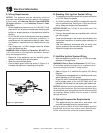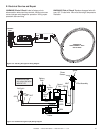
Heatilator • Novus NDV Series • 4055-187 Rev. V • 1/1244
Horizontal
overhang
12
X
20 in.
(508 mm)
Lowest
Discharge
Opening
Termination
Cap
Roof Pitch
is X / 12
Vertical
wall
H (min.) - Minimum height
from roof to lowest
discharge opening.
24 in. min.
(610 mm)
Roof Pitch H (Min.) Ft. Roof Pitch H (Min.) Ft.
Flat to 6/12 1.0* Over 11/12 to 12/12 4.0
Over 6/12 to 7/12 1.25* Over 12/12 to 14/12 5.0
Over 7/12 to 8/12 1.5* Over 14/12 to 16/12 6.0
Over 8/12 to 9/12 2.0* Over 16/12 to 18/12 7.0
Over 9/12 to 10/12 2.5 Over 18/12 to 20/12 7.5
Over 10/12 to 11/12 3.25 Over 20/12 to 21/12 8.0
* 3 ft. minimum in snow regions
Storm Collar
Roof
Flashing
Figure 10.14 Minimum Height From Roof To Lowest Discharge
Opening
G. Install Metal Roof Flashing
• See minimum vent heights for various pitched roofs
(Figure 10.14) to determine the length of pipe to extend
through the roof.
• Slide the roof fl ashing over the pipe sections extending
through the roof as shown in Figure 10.15.
H. Assemble and Install Storm Collar
CAUTION! Risk of Cuts/Abrasions/Flying Debris. Wear
protective gloves and safety glasses during installation.
Sheet metal edges are sharp.
• Connect both halves of the storm collar with two screws
(see Figure 10.16).
• Wrap the storm collar around the exposed pipe section
closest to the roof and align brackets. Insert a bolt
(provided) through the brackets and tighten the nut to
complete the storm collar assembly. Make sure the collar
is tight against the pipe section.
• Slide the assembled storm collar down the pipe section
until it rests on the roof fl ashing (see Figure 10.17).
• Caulk around the top of the storm collar.
Figure 10.16 Assembling the Storm Collar
Figure 10.17 Assembling the Storm Collar Around the Pipe
CAULK
Figure 10.15
Figure 10.15
NOTICE: Failure to properly caulk the roof fl ashing and pipe
seams may permit entry of water.
• Caulk the gap between the roof fl ashing and the outside
diameter of the pipe.
• Caulk the perimeter of the fl ashing where it contacts the
roof surface. See Figure 10.15.
• Caulk the overlap seam of any exposed pipe sections that
are located above the roof line.



